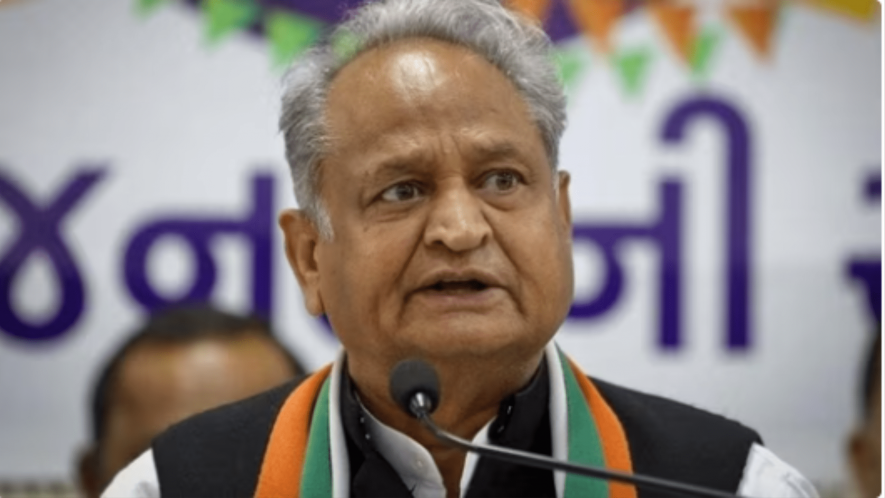Activists Doubt Rajasthan Minimum Income Guarantee Bill Promises

Rajasthan chief minister Ashok Gehlot. Image Courtesy: PTI
The Rajasthan Assembly passed the Rajasthan Minimum Income Guarantee Bill, 2023, with a voice vote on Friday.
The legislation promises 25 extra days of work plus 100 days of employment under the Mahatma Gandhi National Rural Employment Guarantee Act (MGNREGA) and 125 days of work in urban areas under the Indira Gandhi Urban Employment Guarantee Scheme.
Besides, a pension of Rs 1,000 will be paid to the elderly, disabled, widows and single women with a 15% annual increase.
Social security is the right of every person in the state and it cannot be denied, chief minister Ashok Gehlot said in the Assembly. The state government wants to ensure the right, he added.
The financial memorandum of the Bill reads, “The state government has made the Budget announcement on the Mahatma Gandhi Minimum Guaranteed Income Scheme for providing entitlement-based social security to support the individuals and/or households of the state an additional income. If enacted, clause 3 of the Bill shall involve expenditure from the Consolidated Fund of the State.”
It adds, “The implementation of different provisions of this Bill shall be taken care of by the regular budgetary allocation. However, an additional expenditure of Rs 2,500 crore per year is anticipated, which may increase with time.”
Nikhil De, a founder member of Mazdoor Kisan Shakti Sangathan, said that the Bill’s passage is a “historic moment in the state and there will be pressure on other state governments to enact laws ensuring minimum income”.
He told Newsclick over the phone that the state bureaucracy “cannot deny work with the new law. We are happy that the Bill was passed after decades of struggle. A state government giving a Rs 1,000 pension will create moral pressure on the Union government, which gives only Rs 200 to elderly persons below the poverty line. The amount hasn’t been increased since 2007”.
De hoped that the state government “will continue to dedicate funds to make the law successful. The government has kept Rs 12,000 crore for paying pensions. If they deny funds, there will be a struggle”.
When asked about MNREGA and the denial of work, he said, “Even the Centre hasn’t denied that it will not provide work or funds. However, we are agitating against it too. This is why we have demanded a Bill ensuring accountability in delivering these benefits.”
State CPI(M) secretary and former MLA Amra Ram maintained that the critical issue is the government’s seriousness in delivering the promises and payments even if work is provided per the legislation.
“CM Ashok Gehlot had promised that farm loans will be waived. But not one farmer’s loan was waived. The legislation guarantees work. But MNREGA workers have been waiting for payments for more than six months. Several of them for their dues after we protested,” he told Newsclick.
Ram doesn’t have the data for the entire Rajasthan but citing the figures for Dataramgarh, from where he was elected, he said, “There is tenfold less work. When MGNREGA was introduced in 2008-09, there were 24,000 workers. Now, there are only 2,400 workers. The Rs 251 wage under the scheme is not paid across the state.”
He added that the attitude of the state and Centre remains the same when providing work to poor households. “One of them restricts work and the other one funds.”
Citing the example of MGNREGA supervisors, he said, “They have been unpaid for one year after their remuneration component was clubbed with materials component. The Centre is yet to release the money. The Bill can do little for agricultural workers if the supervisors do not get the money in such dire straits.”
However, Mohankumar S, officiating director of the Institute of Development Studies, Jaipur, said that the state government made several positive interventions in the form of the Right to Health, Rajasthan Platform Based Gig Workers (Registration and Welfare Bill and Rajasthan Minimum Income Guarantee Bill).
“The Bill ensures 125 days of work under MNREGA. It will be a challenge because Rajasthan’s average work under MGNREGA never surpassed 56 days; it was below 50 during the pandemic. The law also ensures a 15% annual increase in pensions, which beats the state’s 6% inflation rate. The state government has also made monetary provisions to back the scheme.”
Get the latest reports & analysis with people's perspective on Protests, movements & deep analytical videos, discussions of the current affairs in your Telegram app. Subscribe to NewsClick's Telegram channel & get Real-Time updates on stories, as they get published on our website.























